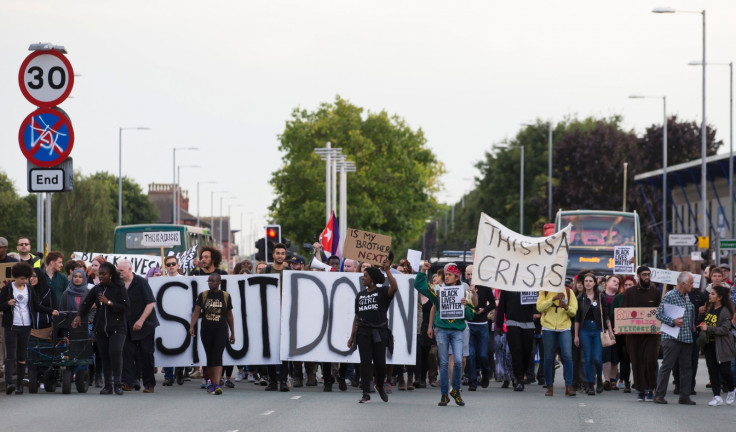Black Lives Matter has always belonged in the racist UK
Not only is the UK built on the backs of the enslaved but also on the ideas of dead racist white men.
Since the deaths of Alton Sterling and Philando Castile at the hands of US police in early July, we've witnessed a wave of protests and demonstrations across the US and Europe. Many people accuse the newly emerging Black Lives Matter movement in the UK of 'bandwagoning' and argue it is not relevant in this country. Here are four reasons why the movement has always belonged in the UK, as well as the US and worldwide.
The UK/Europe has a long history of institutional racism
The dehumanisation of people of colour is no new phenomenon. In the UK it it is ever prevalent in our school, university and general education at every turning point. Darwinian theory bred the scientific racism leading to the eugenics movement, giving legitimacy to the enslavement and dehumanisation of Africans. Despite being part of our GCSE curriculum, we are rarely taught the roots and mindset of Darwin's theories.
We can still see these ideas perpetuated throughout the UK today. It often leads to many black children in schools being channelled into sports education because of an ingrained belief that they are mentally inferior and physically more suited to manual labour or sport. Thus the idea that black people are only good as sportsmen/women and entertainers is born. Just to clarify, this is racist.
The UK shipped racist ideology to the Americas
When the British invaded the Americas in the 1600s – much to the detriment of Native American life and culture – racist ideologies about the inferiority of different races went overseas with the British settlers. These ideas were considered to be at the core of 'enlightenment' during the period. They have had a lasting effect on both US and UK norms. The US was built on the UK's racism. To pretend state-sanctioned violence is only an issue in America is to neglect how it first got there.
Racism in the UK is more covert, but this is only because we've had longer to establish and cement it. Moreover, we are socialised to have a stiff upper lip and not to complain. By hiding our beliefs in legislature and procedure, institutional racism has been woven into the fabric of Britishness. Not only is the UK built on the backs of the enslaved, but also on the ideas of dead racist white men.
Police brutality has been part and parcel of the black British experience for decades
It is true that UK police do not carry guns. However, the excessive force used by UK police when targeting and restraining black men appears to have lead to multiple deaths in police custody. The stories of those who died are rarely made newsworthy, reinforcing a lack of regard for black life in the UK.
Since the 1990s, 1,563 deaths have occurred in police custody or following contact with the police, according to the charity INQUEST. It says a "disproportionate number of those who die in all forms of detention or following contact with the police following the use of force or serious neglect are from black and minority ethnic (BAME) communities".
Out of the British national prison population, 10% are black and 6% are Asian. For black Britons this is significantly higher than the 2.8% of the general population they represent.
In 2013/14, stops and searches were four and a half times more likely to be carried out of black people, twice as likely on mixed ethnic groups, and one and a half times as likely on Asian ethnic groups, than on white people. The Macpherson Inquiry following the death of Stephen Lawrence proved such inequality is rife in UK policing, yet what has been done to address it?

BLM UK is a multi-faceted fight focusing on specific British issues of inequality
Black Lives Matter in the UK cannot appropriate or bandwagon the American movement if the same xenophobic ideology was woven into the fabric of British society before the colonisation of the Americas. There is no denying we face different challenges in the UK. But BLM UK is a fight specific to British issues of racism within the police force, education, home ownership, gentrification, healthcare bias, media demonisation, seeking refuge, reparations and so on.
The UK movement starts on our doorstep: supporting the lives of refugees, the families of police brutality victims, and raising awareness on the Prevent agenda. Black Lives Matter is a banner for addressing multiple issues. Racism in the UK cannot be solved in one way. It is a multi-faceted campaign to rehumanise historically and socially oppressed peoples.
There are a variety of issues we haven't even touched on that legitimise the presence of Black Lives Matter in the UK, including the economic history of chattel slavery and lack of representation of people of colour across the board.
These issues have not arisen overnight, but instead have been subtly and covertly cemented into every aspect of modern day British life — whether we notice it or not.
Aliyah Hasinah is a writer, poet and creative producer focusing on issues of racial disparity, inter-sectionality and representation. She has previously created content for BBC Three, Channel 4 Random Acts and is soon to be published in an anthology by Saqi Books. Follow @AliyahHasinah
© Copyright IBTimes 2025. All rights reserved.





















